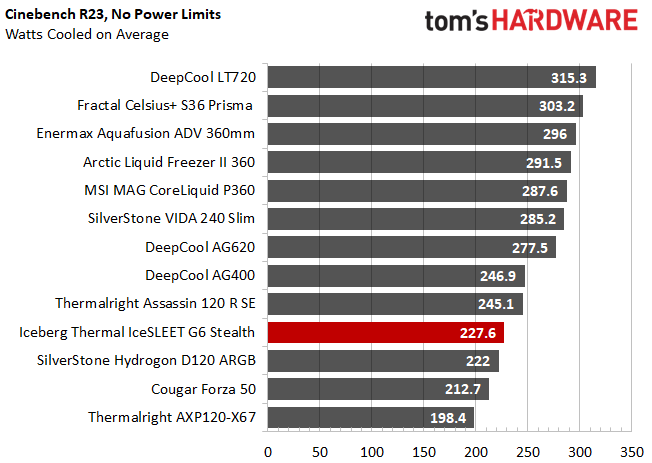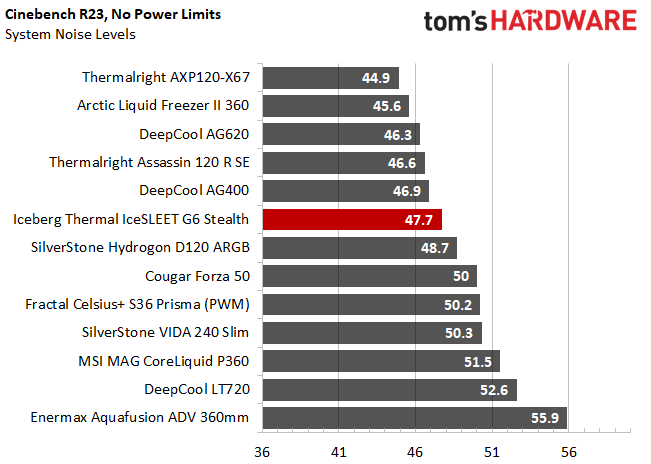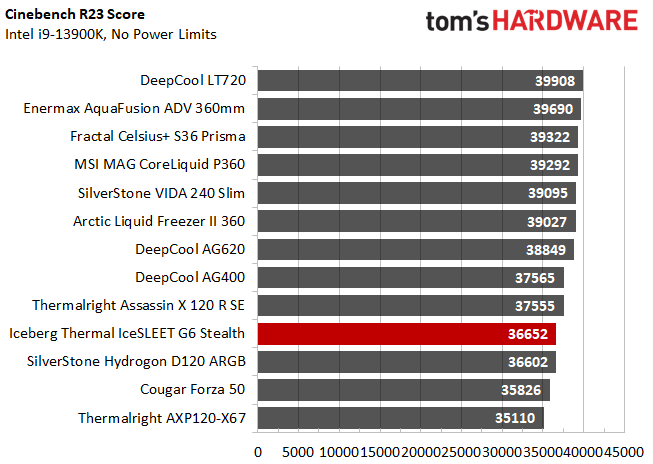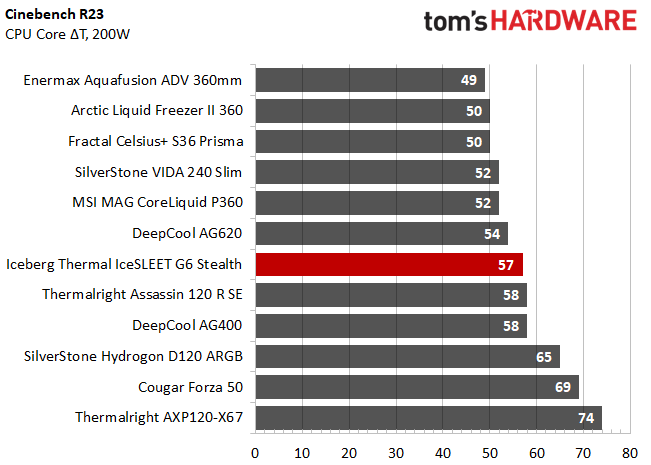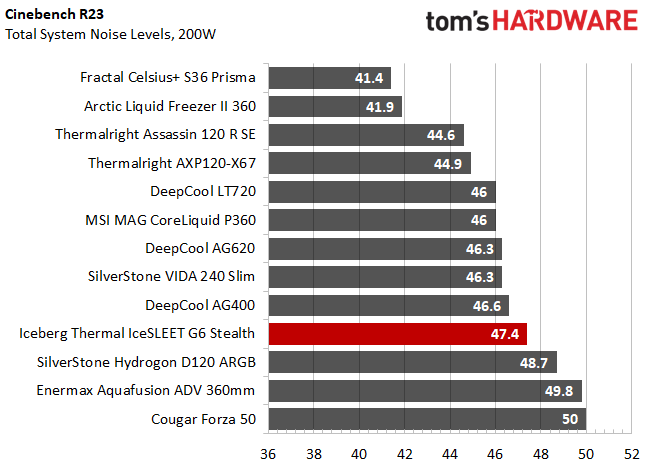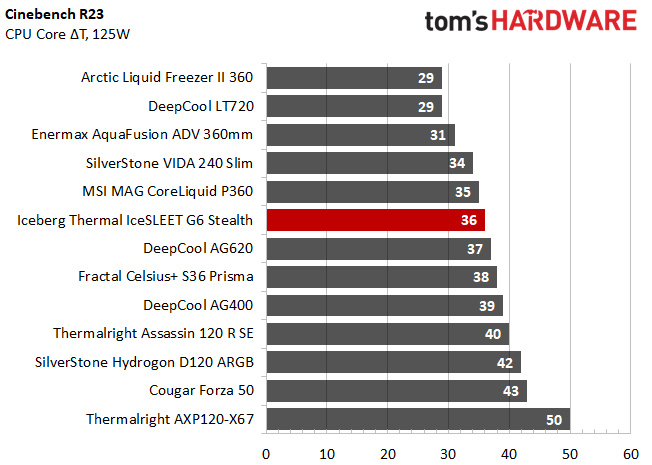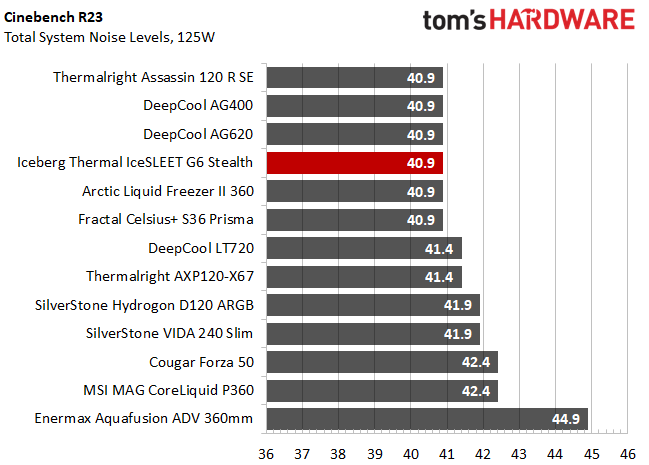Why you can trust Tom's Hardware
No Power Limits: Cinebench Results
With Raptor Lake’s i9-13900K pushing speeds of 5.5 GHz or more, even the strongest of coolers hit TJ Max while running Cinebench R23 and other demanding scenarios. As the 13900K is designed to aim for its top safe temperature, we’ll be comparing the overall benchmark score and the CPU’s clock speeds instead.
The results below are for a 10-minute testing run. To be sure that was sufficiently long to tax the cooler, we also retested both Thermalright’s Assassin X 120 R SE and DeepCool’s LT720 with a 30-minute Cinebench test. The results didn’t change much with the longer test: The average clock speeds maintained dropped by 29 MHz on DeepCool’s LT720 and 31 MHz on Thermalright’s Assassin X 120 R SE. That’s an incredibly small 0.6% difference in clock speeds maintained, a margin of error difference that tells us that the 10-minute tests are indeed long enough to properly test the coolers.
Because of the difficulty of cooling the i9-13900K in this workload, we feel the best way to compare coolers here is to record the average power consumption of the CPU. When it comes to total cooling capacity, the IceSleet G6 Stealth was able to cool roughly 227 watts, slightly higher than the company's official rating of 225W. This places it in exactly the middle of our air cooling results. Three air coolers performed better and three performed worse.
As Cinebench R23’s multi-core benchmark will push coolers to their limits, it’s also a great test for recording the worst-case scenario of fan noise levels. You might notice that our noise charts start at 36dB. This is the noise floor of our testing environment.
This makes 36dB our baseline measurement, as we’re unable to measure noise levels below this threshold. Keep in mind that noise measurements are logarithmic, meaning the perceived differences between the noise levels of the coolers will be more noticeable to the average ear than these graphs would suggest.
When it comes to acoustic levels, the IceSleet G6 is also right in the middle of our results in this test. Five of the coolers we've tested ran quieter than the G6, while six were louder.
We’re also showing the total Cinebench R23 benchmark scores to show how little is lost – or gained – with different cooling solutions. Between the weakest and strongest coolers, there is a total benchmark score variance of roughly 13%.
The benchmark score of Iceberg Thermal’s IceSleet G6 Stealth here is, again, middle-of-the-road for our air cooling test results, scoring a total of 36.65K points. Three comparison air coolers performed worse than the G6 Stealth, and three performed better.
Get Tom's Hardware's best news and in-depth reviews, straight to your inbox.
200W Cinebench Results
When restricting power consumption to a more reasonable 200W, the IceSleet G6 Stealth’s performance is impressive - second only to DeepCool’s AG620 among our tested air coolers. But that’s only part of the story; how loud does it get when the CPU is set to 200W?
Looking at acoustic levels when restricted to 200W, the IceSleet G6 Stealth’s results aren’t quite as impressive as the thermal results. At 47.4 dBA, the results here aren’t expressly bad. But this result is louder than most of the competing coolers tested here.
125W Cinebench Results
The lowest power limit I test at is 125W, mainly because this is also the lowest level where I can reliably measure noise measurements. Lower power consumption causes the noise of most CPU cooler fans to fall below the sound created by the system fans (even while restricted to 35% speed).
Looking at thermal results alone, the IceSleet G6 Stealth again does well, running at lower temperatures than any other air cooler tested. However, noise levels arguably more important than temps at 125W, and in this metric, the IceSleet G6 Stealth does very well — it was inaudible over the sound of the restricted system fans. This is an achievement accomplished by only half of the coolers we’ve tested on this platform.
Conclusion
Iceberg Thermal’s IceSleet G6 Stealth is a good cooler on a number of levels. It runs particularly quietly in low TDP loads, due to the Auto Stop/Start feature. Its fans have an impressive 17.5-year rated lifespan, and it comes with an unheard-of 10-year warranty.
This being said, it's tough to recommend due to its high MSRP. If you can find it on sale well below $80, it's worth considering. But even with the phenomenal warranty and long-rated lifespan, this coolers price is hard to swallow when options like Thermalright's excellent Peerless Assasin 1210 SE sell for less than $40.
MORE: How to Buy the Right CPU Cooler
MORE: How to Check CPU Temperature
MORE: All CPU Cooling Content

Albert Thomas is a contributor for Tom’s Hardware, primarily covering CPU cooling reviews.
-
Modey2222 Still waiting for yourReply
EKWB Nucleus AIO CR360 Lux D-RGB Review since you do it with the 13900K -
SyCoREAPER The fact that this uses what seems to be a proprietary fan to be able to click in place makes that an instant no go and no copper plate? Just the aluminum heatpipes making direct contact?Reply
For the price all the above is unacceptable. -
A120068030 Would have been good to see a comparison with the go to high performance air cooler, the venerable Noctua NH-D15.Reply -
Albert.Thomas ReplyModey2222 said:Still waiting for your
EKWB Nucleus AIO CR360 Lux D-RGB Review since you do it with the 13900K
Soon ™ -
Albert.Thomas Replysycoreaper said:The fact that this uses what seems to be a proprietary fan to be able to click in place makes that an instant no go
The fan is not proprietary, the click in place system can be used with any standard fan.
sycoreaper said:and no copper plate? Just the aluminum heatpipes making direct contact?
It's a nickel plated copper plate.
sycoreaper said:For the price all the above is unacceptable.
I agree. This cooler is too expensive. -
sickbrains So the only negative is the price right? Otherwise it's a pretty good cooler? Cause I found it for €30 here in the Netherlands compared to the Peerless Assassin for +€40 and I like the looks of this cooler more especially for in a DeepCool CH160 build I'm planning.Reply
